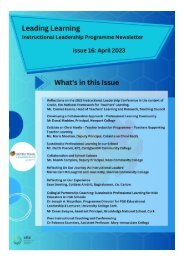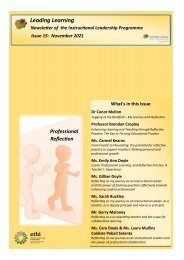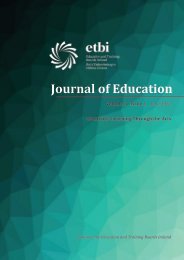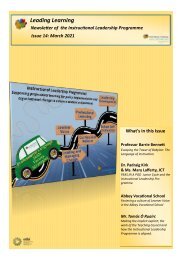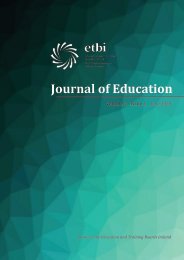ETBI Journal of Education - Vol 2:2 November 2020 (Irish-medium Education)
This bilingual edition of the Journal of Education celebrates Irish-medium Education
This bilingual edition of the Journal of Education celebrates Irish-medium Education
Create successful ePaper yourself
Turn your PDF publications into a flip-book with our unique Google optimized e-Paper software.
<strong>ETBI</strong> <strong>Journal</strong> <strong>of</strong> <strong>Education</strong> <strong>November</strong> <strong>2020</strong><br />
Laustsen, 2006; Gill, 2017; Gill, 2018; Mac Pháidín,<br />
2004, 2008; Solstat, 1994; TUI, <strong>2020</strong>). Central to<br />
this is the provision <strong>of</strong> sustainable primary and<br />
post-primary level education; if an island loses<br />
its primary school, young families are quickly<br />
forced to abandon the island, with all the negative<br />
consequences which follow regarding the make<br />
up <strong>of</strong> the island community, the island population<br />
and the future <strong>of</strong> the island as a living community<br />
(Egelund & Laustsen, 2006; Gill, 2017; Mac<br />
Pháidín, 2004; Solstat,1994). What <strong>of</strong>ten results<br />
is a process <strong>of</strong> gentrification, i.e. that the only<br />
people left on the island are those who possess<br />
holiday homes (Egelund & Laustsen, 2006; Gill,<br />
2017).<br />
COMMUNITY ACTIVATION<br />
The implementation <strong>of</strong> the Gaeltacht Act (2012)<br />
caused schools and communities to engage<br />
productively with each other. The DES Gaeltacht<br />
<strong>Education</strong> Policy (2016), a policy welcomed by the<br />
ETB sector, helped island school communities and<br />
the general island community to interact formally<br />
with each other, recognising the existential<br />
requirement for networked cooperation (<strong>ETBI</strong>,<br />
2016; Gill, 2018; GRETB, 2017; Mac Pháidín,<br />
2018). Island schools need to engage with the<br />
community <strong>of</strong> the island itself as well as engaging<br />
with the state system.<br />
Pr<strong>of</strong>essor Peter Gill, from the University <strong>of</strong><br />
Gävle in Sweden, a country with 26 inhabited<br />
islands and schools on 10 <strong>of</strong> them, has conducted<br />
research into island education. In Finland, Gill<br />
(2017) reports on research by Solstad (1994),<br />
which states that only 50% <strong>of</strong> schools in that<br />
country are ‘community-active’ schools, meaning<br />
the local community and school have strong links<br />
with each other. According to Gill, the remaining<br />
non community-active schools and the islands<br />
on which they are situated are at elevated risk<br />
<strong>of</strong> accelerated decline. The integrated approach<br />
<strong>of</strong> the GRETB and DETB Gaeltacht immersion<br />
colleges have confirmed that the five post-primary<br />
schools on islands <strong>of</strong>f the Galway and Donegal<br />
coast respectively are ‘community-active schools’<br />
(GRETB, 2017; Mc Hugh, 2017; Oireachtas<br />
Éireann, 2018).<br />
EDUCATION ON AN ISLAND – A UNIQUE<br />
EXPERIENCE<br />
When the ETB schools succeeded in keeping their<br />
island students at home and accommodate them<br />
locally, it was noted that the exchequer had, up<br />
to that point, funded the islands’ teenagers when<br />
they were living with families on the mainland<br />
for the purposes <strong>of</strong> completing upper secondary<br />
education, culminating with Leaving Certificate<br />
examinations (Mac Pháidín, 2004). This process<br />
was innovatively reversed with the establishment<br />
<strong>of</strong> the Scheme for Learners <strong>of</strong> <strong>Irish</strong> – a Year on<br />
an Island, in 2007. The scheme, sponsored by<br />
the Department <strong>of</strong> Culture, Heritage and the<br />
Gaeltacht, and organised by GRETB between<br />
Coláiste Naomh Éinne, Coláiste Naomh Eoin<br />
and Coláiste Ghobnait on all three Aran Islands,<br />
facilitated up to 10 students from the mainland to<br />
come to each <strong>of</strong> the three island schools to spend<br />
a school year learning <strong>Irish</strong> with full financing<br />
provided for accommodation, up to a value <strong>of</strong><br />
€6,000 per pupil. https://colaisteghobnait.com/<br />
apply/<br />
YEAR ON AN ISLAND SCHEME – THE STUDENT<br />
EXPERIENCE<br />
Scheme students stay with a family on the island<br />
for the school year and therefore their experience<br />
PAGE 130




